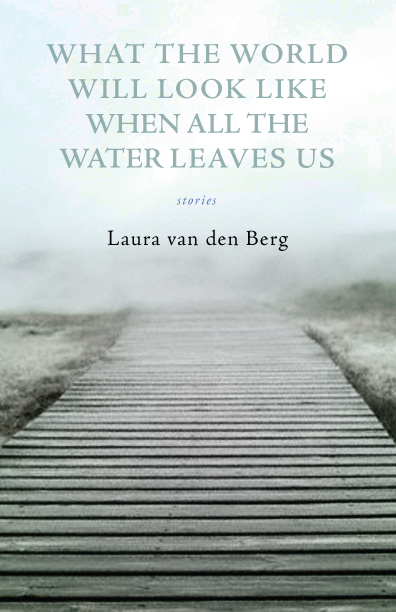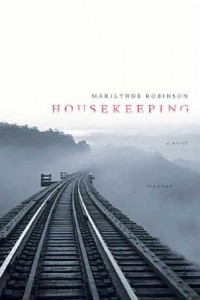 I imagine the seasonally unspecified stories in Laura van den Berg’s What the World Will Look Like When All the Water Leaves Us must be set in spring because spring is a time that makes me feel young, young as girls and in as much danger. And then there’s always this odd moment of realization that I am young and a girl and in some dangers. I’m still in too-close contact with boys I once loved, still prone to crying in public, still not aware of the dynamic personal lives of adults. Spring in the Midwest is about babies and hope and vitality, but it’s also about knowing that eventually a late frost is going to swing in out of no place and kill everything you haven’t collected in the shed. And I wanted the people in these stories locked up safe.
I imagine the seasonally unspecified stories in Laura van den Berg’s What the World Will Look Like When All the Water Leaves Us must be set in spring because spring is a time that makes me feel young, young as girls and in as much danger. And then there’s always this odd moment of realization that I am young and a girl and in some dangers. I’m still in too-close contact with boys I once loved, still prone to crying in public, still not aware of the dynamic personal lives of adults. Spring in the Midwest is about babies and hope and vitality, but it’s also about knowing that eventually a late frost is going to swing in out of no place and kill everything you haven’t collected in the shed. And I wanted the people in these stories locked up safe.
Perhaps this is why Laura van den Berg’s collection was one of only two books last year that made me cry (the other being Lorrie Moore’s new novel).The stories here are chasing the tails of the same legends as their characters: Bigfoot, the Loch Ness Monster, contentment. And these stories were saddest because these characters always almost had what they wanted; but for whatever reason, they just couldn’t reach out for it.
That refusal, sometimes outright and sometimes covert, was what intrigued me most about these women, these creatures van den Berg has worked up. In the collection’s opener, “Where We Must Be,” a girl avoids moving back home by taking a job as a Bigfoot in an adventure park; in “The Rain Season,” another runs all the way to Africa from the grief of a loss. Other girls date men inappropriate for one reason or another; still others refuse to date at all. Healthy? Well, certainly not, but safe enough. Until suddenly life isn’t any more.
Shelby, for example, of “Goodbye My Loveds,” drops just about everything when her parents die in the Amazon searching for the mapinguary, a probably-only-legendary primate. She leaves college, abandons friends and sex. She doesn’t have to, but she can’t bear not to. She tries to cope by steeping her new life in fact—working with books, writing letters in hopes of finding out more about her parents’ death, trying to neighbor-proof her little brother—but people on grand quests flock to her nonetheless. Like the boy who comes into her store each week in search of a first edition Moby Dick; like her own brother, who, after the deaths, had “come to believe in magic, in making the unknown knowable. [She] viewed him with equal doses of fear and imagination.” Both boys approach their lives with some essential mixture of preciousness and futility, and under their influence it becomes obvious to Shelby, and to us as readers, that self-deprivation is not an entirely solitary business.
It’s a lesson to be learned in “Inverness” as well, and it’s almost literalized. Emily, a botanist, goes to Scotland to find a rare and endangered flower, and ends up staying at an inn with a team of Nessie-hunters. The only local of the bunch, McKay, is also the only one willing to go down to the darkest parts of Loch Ness to search for the creature, shut up in a mini-submarine. Emily is a bit troubled by this, but she finds “something electric about him too, something inviting. [She] wondered if he was frightened when the submarine disappeared beneath the surface, or if a part of him wanted to remain there always.” Soon after, McKay’s wife tells Emily, “ ‘I think, one day, he’ll find something that satisfies him and the quest will be over…I’m not even sure what that would be like, what that would mean.’”
Neither way, apparently, is the way to win it, for women like these, for the people they are drawn to. What they want are answers—how to raise a brother, how to mourn a loss, how to become some other woman, some adult human—but they’re unsure of how to ask for them, or how they might learn them on their own. They’re at this critical and liminal point: right on the border of another life and able to glimpse it, but either too terrified to reach for it or unsure of how to negotiate the distance. Perhaps this is because the creatures in these stories who are supposed to provide these answers—who are supposed to be stable or rational—aren’t often so. “That seems unreasonable,” teenaged Celia of the collection’s title story tells her mother when told she has too much fear in her to get what she wants. “Reason is overrated,” the mother says, “Caution and beauty too.”
And whether it is out of fear for their lives to come, or the fact that what these young women have glimpsed of the adult world isn’t particularly stable, they pick paths that seem to deepen the pain, not quell it. They becomes missionaries to the Congo, though they have never been Christians; they take care of cancer patients instead of pursuing their post-college whims; they fling themselves to any point at all on the map to try to outrun their losses. After such disappointment, something about stasis seems dangerous. Or perhaps they think grief won’t be able to find them in these other lives they’re impersonating.

Lorrie Moore
This is where van den Berg shines, for me—catching people when they know they must do something and freezing them on the page in exactly the way they feel paralyzed and exposed. With other women writers (Lorrie Moore, Deborah Eisenberg), I look at the female leads and I can say: Yes, I see, I could be you one day. But I was a van den Berg woman yesterday, and I will be her tomorrow, and I won’t be able to see her changing until she’s already different. And when I am, I might be as foreign to myself as if I’d become a lake monster.
One night Emily goes up to her room and tries to write a letter to the man who left her, who she’s trying to outrun. She writes—and you can feel how quiet she is, how desperate and done—“How is it that you are already leading a different life? I cannot say that I wish you well. Maybe one day I will.” Celia, who travels all around the world with her scientist mother, remembers that a new trip used to be all intrigue and excitement, but now there’s just “a heaviness, a feeling of premature exhaustion and age.” These are girls with extraordinary gifts, on extraordinary journeys of one nature or another, but girls aren’t supposed to have to need things like that so early in life. They shouldn’t need to search so long and far for things that make the world mysterious.
 More than once, as I was reading What the World Will Look Like When All the Water Leaves Us, I was reminded of a moment near the end of Marilynne Robinson’s Housekeeping. Ruth, the narrator, is thinking on how she and her aunt, Sylvie, coexist: “[Sylvie] could forget I was in the room. She could speak to herself, or to someone in her thoughts, with pleasure and animation, even while I sat beside her—this was the measure of our intimacy, that she gave almost no thought to me at all.” Now, van den Berg’s women are no Ruths. Never could they be so stoic, so thoroughly level-eyed with their emptiness. They don’t take loss like Ruth; in fact, though they might believe otherwise, they don’t truly take loss at all. But Ruth’s next thought is one that sounds off with this collection: “But if she lost me, I would become extraordinary by my vanishing.”
More than once, as I was reading What the World Will Look Like When All the Water Leaves Us, I was reminded of a moment near the end of Marilynne Robinson’s Housekeeping. Ruth, the narrator, is thinking on how she and her aunt, Sylvie, coexist: “[Sylvie] could forget I was in the room. She could speak to herself, or to someone in her thoughts, with pleasure and animation, even while I sat beside her—this was the measure of our intimacy, that she gave almost no thought to me at all.” Now, van den Berg’s women are no Ruths. Never could they be so stoic, so thoroughly level-eyed with their emptiness. They don’t take loss like Ruth; in fact, though they might believe otherwise, they don’t truly take loss at all. But Ruth’s next thought is one that sounds off with this collection: “But if she lost me, I would become extraordinary by my vanishing.”
These are girls who could do anything, but what they do is disappear. From an old life, at least. And it gets easier to run when it seems as though you’ve reached something better. It’s easier still when you start to think it means—must mean—there’s a point of departure; a big significant Thing you can take cues from. It gets bigger as it gets farther behind you and you can think of it more fondly that way, and that’s the way you like it. But for all this you still take backward glances at it, and sometimes you stop running from it altogether and hold out your hand to it, and if you could in fact stretch your fingers that extra half inch and catch hold of a fold of fabric or another hand, what would you even begin to do with it?







